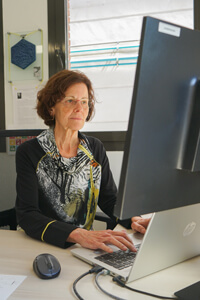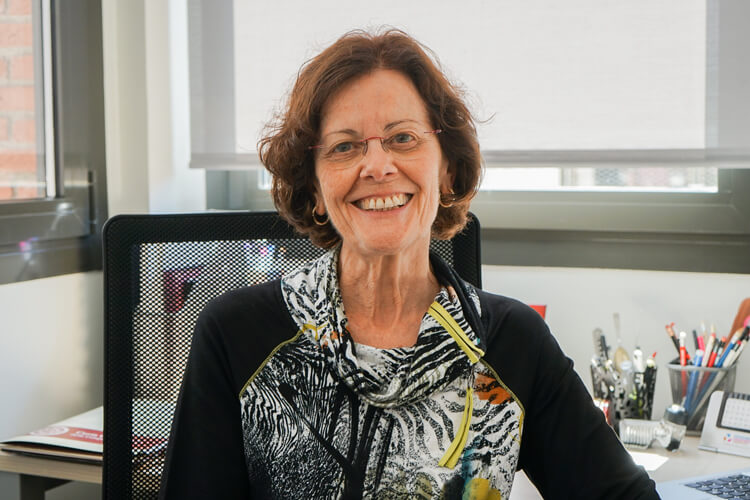Interview with Dr Rosa Nomen
As part of the 15th Mediterranean Congress in Chemical Engineering – MeCCE, as part of Expoquimia 2023, we are speaking with Dr Rosa Nomen, the president of this year’s congress and a tenured professor with the Department of Chemical Engineering and Materials Science at the IQS School of Engineering.
The common thread of this upcoming congress is to reaffirm the connection between the scientific world and the industrial world from the perspective of Chemical Engineering, with a gaze fixed on the 2030 Agenda and its challenges, to be able to jointly establish the pathways of future industrial processes.
Rosa, could tell us about your relationship with the MeCCE?
My relationship with the congress started in 1997 as just another participant. Towards the end of the 1990s, I became part of the scientific committee, together with Dr Julià Sempere. Years later, in 2017, I formed part of the organizing committee of the World Congress of Chemical Engineering as a result of my connection to the European Federation of Chemical Engineering, of which I was the executive vice president. In 2023, I’m now the president of this new edition.
Which is the 15th, correct?
Forty-five years ago, this congress was held for the first time as part of Expoquimia, held every three years. This year, we are getting back to normal after the COVID-19 pandemic.
The MeCCE started in 1978, commissioned by the SEQUI (Spanish Industrial Chemistry and Chemical Engineering Society) to organize a scientific and academic congress which also featured the industrial sector. The congress took ACHEMA (the Frankfurt fair) as a model by creating a space to simultaneously celebrate a trade fair and a scientific congress.
This combination has become weaker in recent editions, and we need to re-establish it as the central pillar of the congress. After the 2021-2022 edition, my proposal was to be able to fully regain the industrial sector’s participation in the congress. Chemical engineering works for industry and, therefore, we need to know what industry needs in order to all go in the same direction, or at least in directions that can end up flowing together.
“Chemical engineering works for industry and we need to know what industry needs in order to all go in directions that can end up flowing together”
What registration and participation information do you have?
We have recovered and even surpassed the registration numbers from 2020, especially in the number of abstracts. We’re still quite a way from the World Congress of Chemical Engineering of 2017, which was an extraordinary event, as it should be. However, we’re highly satisfied both by the number of participants as well as by the quality of their contributions.
What are the central topics of this edition?
We could say that they revolve around the SDGs, the Sustainable Development Goals, which are in line with the pillars that concern the Chemical Industry today and which are on the European Union’s 2030 Agenda. Essentially, the central topics are the most fundamental ones at present: digital disruption, currently experience a great boom; decarbonization, based on CCUS (CO2 Capture, Use, and Storage), to the use of hydrogen, photocatalysis, and synthetic fuels; the circular economy, from topics of recycling to the green deal; and new materials and functional surfaces. In other words, taking the SDGs as an objective, we have focused on the fields which are the areas of great concern for industry today.
I would like to add that we here at the MeCCE scientific committee wanted to make this year’s congress more international in scope, and we are welcoming speakers from across the world.
“In the 15th edition, we wanted to make this year’s MeCCE more international in scope”

We have the luxury of leading speakers in this edition. We are featuring professor Elazer Edelman, the director of one of the five research institutes at the Massachusetts Institute of Technology (MIT), a Bioelectronic engineer who holds a Ph.D. in Physics and Medical Engineering. We feel blessed that he accepted our invitation to participate.
We also have as speakers Dr Lourdes Vega, director of the CO2 and Hydrogen Research Centre at Khalifa University, a leading global expert in CO2 capture and now also on the use of hydrogen; Dr Alec Grossman, president of honour of the Israeli Chemical Engineers Association, a leading expert on topics on the corrosion of facilities, and how this affects Industrial Security; Dr Ángel Irabien, professor with the University of Cantabria, an expert on sustainability and environmental issues who collaborates extensively across the globe; and Dr Javier García, professor and director of the Nanotechnology Laboratory at the University of Alicante and the current – and first Spanish – president of the International Union of Pure and Applied Chemistry (IUPAC).
With all them, we have sought to expand the international scope of the congress, without overshadowing our country’s great potential, and to reflect the main lines of this congress with their contributions.
You’ve talked about how there has to be a connection between academic and industrial chemical engineering. What role do you think chemical engineers at IQS have had in this field?
The connection is obvious, as we’ve already mentioned. Academic chemical engineering doesn’t have any meaning without industrial engineering. In every chemical engineering congress around the world the industrial sector represents at least 40% of the participants, because the academic world should know the sector’s needs and provide real solutions.
Concerning the role of chemical engineers at IQS, I think that one of our university’s raisons d’être, ever since its founding, has been to seek this close connection between business and academia. I believe that IQS engineers have that in our DNA. Conducting projects for industry helps us to be aware of the importance of chemical engineering in these types of collaborations, which are frequently different from those that emerge in the purely scientific sphere. These collaborations are essential for the industrial world. Throughout history we can find many examples of key discoveries that have required chemical engineering to be implemented later in the world in a global, sustainable manner. And now, with the recent pandemic, we have once again had a clear example of how much the world needs chemical engineering research.
Without the knowledge and contributions of chemical engineers, we would never have been able to advance as a society. I think that their role has been, is, and will remain basic and essential.
“Without the knowledge and contributions of chemical engineers, we would never have been able to advance as a society”
What is the relationship between IQS engineers with Expoquimia?
IQS engineers and the AIQS association have been present at Expoquimia since the very beginning. I like to recall that in 1955, as part of the celebration of Father Dr Eduardo Vitoria’s 90th birthday, a “Chemistry Exhibition” was held in his honour in the courtyard of Sant Ignasi High School, promoted by members of AIQS who worked in chemical industries, including companies that they had founded. They suggested creating an exhibition of stands as a gift to Father Vitoria for his birthday. When Expoquimia was founded in 1967, IQS chemical engineers were there, helping to make Expoquimia the International Chemistry Fair of Catalonia and Spain, something that is important for all of us. Since then, we have always been a part of the fair without fail.
What has this link with the industrial world represented for you?
Personally, I really like this dialogue that we are having between the scientific and the industrial world. I’ve always said that I would not have been able to continue at IQS if I hadn’t been able to work for the chemical industry. I love teaching and research. I was really excited to be the first female researcher at IQS to lead a European project in 1988, the first female professor at IQS (in 1983), and the first female tenured professor at Ramon Llull University, together with Dr Marisa Espasa. But working for the chemical industry has been key for us. My group’s research has always been focused on improving industrial processes and making them safer and more sustainable. This has always been a great motivation!
“Our research has always been focused on improving industrial processes and making them safer and more sustainable”
Finally, what do you take from your extensive experience as a chemical engineer at IQS?
First of all, the fact that I have been able to work with highly diverse people, students, co-workers, and colleagues, in the broadest sense of both words, and with industrial engineers.
But very importantly, I would like to highlight the relationship with students, who force you to always be alert and up to date. Above all, I always have to listen actively to understand and take care of their needs. This means constantly giving, but it also involves receiving a lot more. When people told the highly esteemed Father Dr Miquel Montagut that he looked really young, always replied “it’s because I’m surrounded by young people.” That’s a great summary of how I feel.
And above all, I’ve been able to share all this and also my personal life with Julià, Dr Julià Sempere, my husband.


